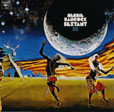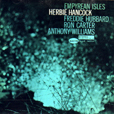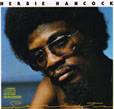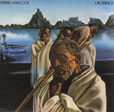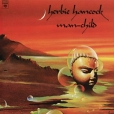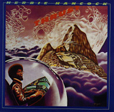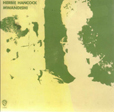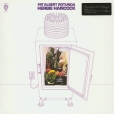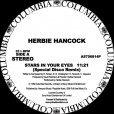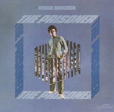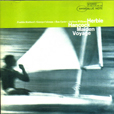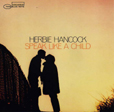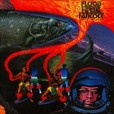Your basket is empty

Bennie Maupin
The Jewel In The Lotus
ECM
‘A more selfless album is hard to imagine,’ according to Down Beat in 1975. ‘The sound is supreme, and all the players strive to achieve a thorough blending.’ Recorded in New York in 1974, the disc’s personnel is drawn from the circle around Herbie Hancock in the period, but the music has a character all its own.
‘A classic of 1970s spiritual jazz, and as much as any recording on Strata East or Black Jazz, Maupin’s ECM offering is a wonder of arrangement and composition with gorgeous ensemble play, long yet sparse passages, space, and genuine strangeness. Maupin plays all of his reeds and flute in addition to glockenspiel here; Summers’ percussion effects include a water-filled garbage can. The two drummers swirling around in different channels don’t ever play the same thing, but counter and complement one another. And Hancock plays some of the most truly Spartan and lyrically modal piano in his career here… This album sounds as timeless and adventurous in the present as the day it was released’ (AllMusic).
‘Luminessence Series.’
‘Classic Vinyl Series.’
‘Herbie took the basic instrumental tracks of Quasar and Water Torture to Patrick
Gleeson’s Different Fur Studios, hoping to learn how to play the Moog synthesizer. Instead, Hancock let Gleeson contribute layers of sound to both pieces: on Quasar extending the horn playing of Bennie Maupin, Julian Priester and Eddie Henderson through electronic accents; on Water Torture providing a ghostly counter melody on the Mellotron (using samples from string instruments). These studio enhancements give Crossings an
otherworldly dimension, making the album feel bigger and more fantastical, yet the Sextet’s playing — recorded without much in way of edits or overdubs — keeps everything grounded. Indeed, Gleason’s additions are often so natural that it is hard to pick out what’s acoustic and what’s synthesized.’
The second LP by the sextet aka the Mwandishi Band, and Herbie’s last for Warner Brothers, clearing the way for the Headunters.
LP from Music On Vinyl.
‘After releasing their Warner Bros. debut, the Herbie Hancock Sextet underwent a major transformation in the early ’70s. Over the course of a year, every member was replaced (except Herbie Hancock himself and bassist Buster Williams) and each adopted Swahili names. Hancock chose the moniker Mwandishi (‘composer’), and the Sextet became unofficially known as the Mwandishi Band.
‘The lineup’s first album reflects Hancock’s new aesthetic and spiritual directions. Stretching out from the r&b/jazz-fusion of Fat Albert Rotunda, the pianist would draw inspiration from his time with Miles Davis…
‘Dedicated to Angela Davis, Ostinato is an extended jam with stunning rhythmic complexity — enhanced by such studio effects as Echoplex delay. On You’ll Know When You Get There, Hancock’s tight arrangements are saturated in reverb, which gives an ever-shifting dimensionality. Side-long closer Wandering Spirit Song, written by trombonist Julian Priester, goes even further out: alternating between dynamic soloing and group improvisation, the Sextet fully manifests the radical potential of their collective identity/energy.
‘A bold and expansive statement, even after nearly fifty years.’
‘A playful, joyous album in which Hancock clearly had a great time, this music was composed for the pilot of a children’s TV show, redirecting the post-bop of his five-year stint with Miles towards new r&b and funk styles. Flying high with three horn players — Joe Henderson, Garrett Brown and Johnny Coles — alongside Hancock’s soaring Fender Rhodes, the group could swing freely on a track like the rousing Fat Mama and emote precisely on the subtle Tell Me A Bedtime Story.’
This is the sublime, eleven-minute version, featuring vocalist Gavin Christopher.
Big Theo Parrish record.
Backed with the promo-only disco mix of Saturday Night, lavished with percussion by Sheila E.
Murders.
‘Classic Vinyl Series.’
After two years’ preoccupation with the Miles Davis Quartet, here is Herbie in 1968, ready for the seventies, the old, uptight bebop instincts melting into the balmy, open, innocent textures of fluegelhorn, bass trombone and alto flute, and his own lightly beautiful playing.
‘Classic Vinyl series.’
The shimmering brilliance of his post-bop Blue Notes, crossed with the JBs and the Family Stone; all of it bathed in Afrofuturism.
We must save jazz from itself, Herbie is saying. Future-shock-treatment; the same surgery pioneered by Miles Davis MD.
Game-changing music, with the fizz and urgency of a live setting; beautifully recorded.
Speakers Corner always does the business.
It opens with HH alone on concert grand, in a lyrical variation of Maiden Voyage, finally reprised by the band, then startlingly segued with Actual Proof, from the new-out Thrust album: already, the zero-gravity glimpse of a transmogrified jazz standard, sixties dues paid; and Herbie perversely tearing up a fender-rhodes future-classic, on acoustic piano…. then straight into Paul Jackson and Mike Clark, one of the very greatest rhythm sections of all time, setting Spank-A-Lee on fire, with Bill Summers on congas, Herbie returning on electric keys, guitarist DeWayne McKnight (prior to locking onto the Mothership)... the unmistakable opening bars of Watermelon Man, ushering Bennie Maupin into full flight… a slinky, skittering Butterfly… a rowdy Chameleon, with Herbie giving it some Sun Ra… and finally a delirious, twenty-minute, desert-island-disc version of Hang Up Your Hang Ups, funky as anything.

